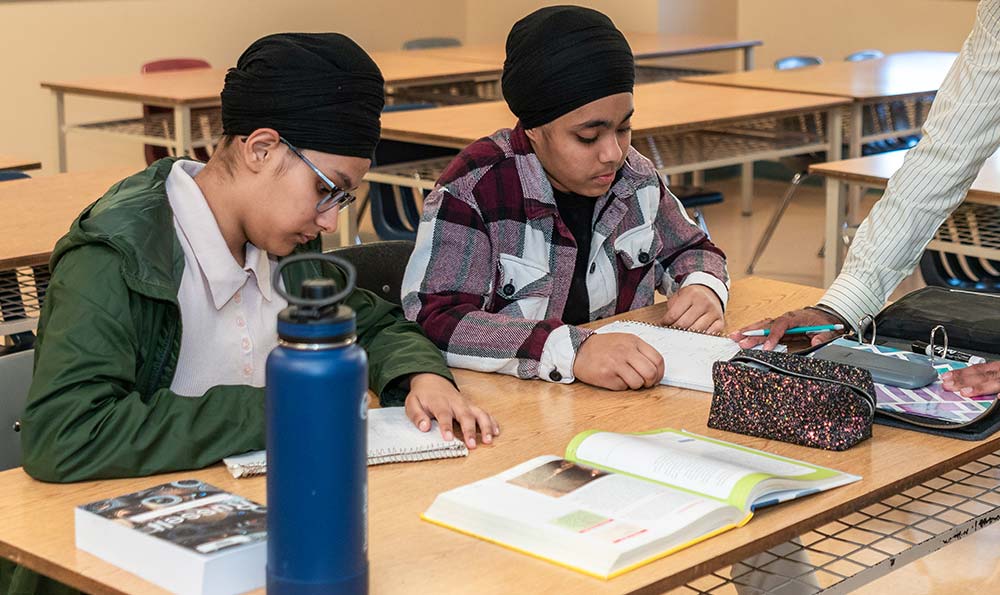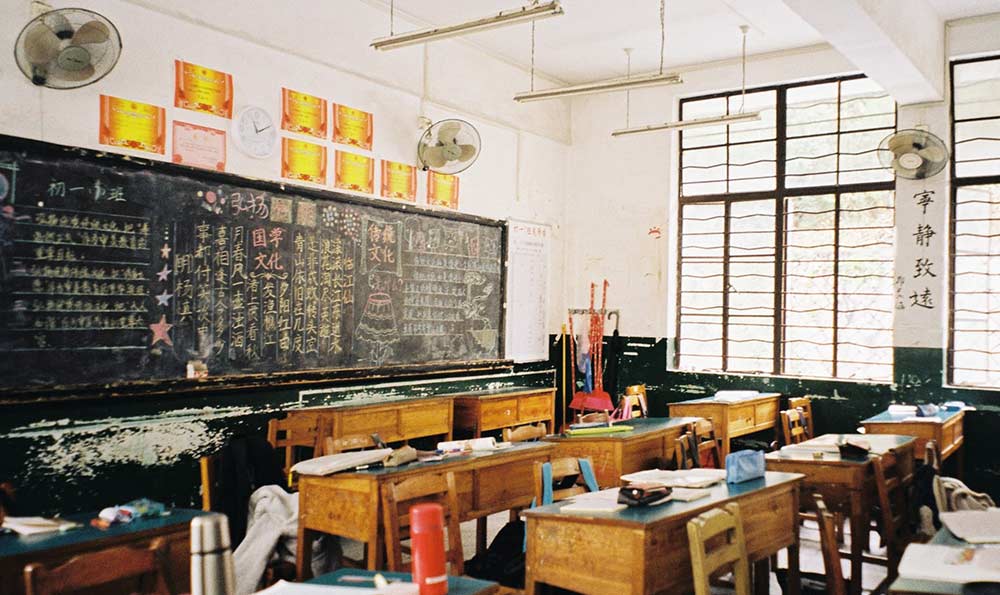阅读是外语学习者获取语言知识和提高语言能力的主要途径,阅读理 解能力是衡量学习者外语水平的重要指标。一起做一下阅读理解训练吧。下面是我为大家推荐的2017高考英语真题阅读理解仅供大家参考! 2017高考英语真题阅读理解总结一 I found out one time that doing a favor for someone could get you into a lot of trouble. I was in the eighth grade at the time, and we were having a final test. During the test, the girl sitting next to me whispered something, but I didn’t understand. So I leaned over her way and found out that she was trying to ask me if I had an extra pen. She showed me that hers was out of ink and would not write. I happened to have an extra one, so I took it out of my pocket and put it on her desk. Later, after the test papers had been turned in, the teacher asked me to stay in the room when all the other students were dismissed. As soon as we were alone she began to talk to me about what it meant to grow up; she talked about how important it was to stand on your own two feet and be responsible (负责任) for your own acts. For a long time, she talked about honesty and emphasized the fact that when people do something dishonest, they are really cheating themselves. She made me promise that I would think seriously about all the things she had said, and then she told me I could leave. I walked out of the room wondering why she had chosen to talk to me about all those things. Later on, I found out that she thought I had cheated on the test. When she saw me lean over to talk to the girl next to me, it looked as if I was copying answers from the girl’s test paper. I tried to explain about the pen, but all she could say was it seemed very very strange to her that I hadn’t talked of anything about the pen the day she talked to me right after the test. Even if I tried to explain that I was just doing the girl a favor by letting her use my pen, I am sure she continued to believe that I had cheated on the test. 1. The story took place exactly ____ . A. in the teacher’s office B. in an exam room C. in the school D. in the language lab 2. The girl wanted to borrow a pen, because ____ . A. she had not brought a pen with her B. she had lost her own on her way to school C. there was something wrong with her wn D. her own had been taken away by someone 3. The teacher saw all this, so she asked the boy ____ . A. to go on writing his paper B. to stop whispering C. to leave the room immediately D. to stay behind after the exam 4. The thing(s) emphasized in her talk was(were) ____ . A. honesty B. sense of duty C. seriousness D. all of the above 5. The boy knew everything ____ . A. the moment he was asked to stay behind B. when the teacher started talking about honesty C. only some time later D. when he was walking out of the room I found out one time that doing a favor for someone could get you into a lot of trouble. I was in the eighth grade at the time, and we were having a final test. During the test, the girl sitting next to me whispered something, but I didn’t understand. So I leaned over her way and found out that she was trying to ask me if I had an extra pen. She showed me that hers was out of ink and would not write. I happened to have an extra one, so I took it out of my pocket and put it on her desk. 我发现一个时间,做一个人能给你带来很多麻烦。当时我在第八年级,我们有一个最后的考验。在测试期间,坐在我旁边的女孩低声说了些什么,但我不明白。我倚在她的方式,发现她想问我是否有额外的笔。她发现她是我的墨水用完,不会写。我碰巧有一个额外的,所以我把它从我的口袋里,放在她的办公桌上。 Later, after the test papers had been turned in, the teacher asked me to stay in the room when all the other students were dismissed. As soon as we were alone she began to talk to me about what it meant to grow up; she talked about how important it was to stand on your own two feet and be responsible (负责任) for your own acts. For a long time, she talked about honesty and emphasized the fact that when people do something dishonest, they are really cheating themselves. She made me promise that I would think seriously about all the things she had said, and then she told me I could leave. I walked out of the room wondering why she had chosen to talk to me about all those things. 后来,已经变成了试卷,老师让我呆在房间里时,所有其他的学生被开除。当我们单独在一起,她开始跟我谈什么是成长;她说,站在自己的两只脚,并负责是多么重要(负责任)为自己的行为。很长一段时间,她谈到诚实,并强调这一事实,当人们做一些不诚实的,他们真的欺骗自己。她让我保证,我会认真考虑所有的事情她说,然后她告诉我我可以离开。我走出房间问她为什么选择了跟我说所有这些事情。 Later on, I found out that she thought I had cheated on the test. When she saw me lean over to talk to the girl next to me, it looked as if I was copying answers from the girl’s test paper. I tried to explain about the pen, but all she could say was it seemed very very strange to her that I hadn’t talked of anything about the pen the day she talked to me right after the test. Even if I tried to explain that I was just doing the girl a favor by letting her use my pen, I am sure she continued to believe that I had cheated on the test. 后来,我发现她认为我在考试中作弊了。当她看到我瘦了跟我旁边的女孩,好像我是从复制的女孩的试卷答案。我试图解释的笔,但她可以说是它似乎非常奇怪,她说我还没有谈到任何关于笔的一天,她跟我就在考试后。即使我试图解释说我只是做女孩的忙,让她用我的笔,我相信她仍然认为,我在考试中作弊了。 2017高考英语真题阅读理解总结二 To be a good teacher, you need some of the gifts of a good actor; you must be able to hold the attention and interest of your audience; you must be a clear speaker, with a good, strong, pleasing voice which is fully under your control; and you must be able to act what you are teaching, in order to make its meaning clear. Watch a good teacher, and you will see that he does not sit still before his class: he stands the whole time he is teaching; he walks about, using his arms, hands and fingers to help him in his explanations, and his face to express feelings. Listen to him, and you will hear the loudness, the quality (音色) and the musical note of his voice always changing according to what he is talking about. The fact that a good teacher has some of the gifts of a good actor doesn’t mean that he will indeed be able to act well on the stage, for there are very important differences between the teacher’s work and the actor’s. The actor has to speak words which he has learnt by heart; he has to repeat exactly the same words each time he plays a certain part, even his movements and the ways in which he uses his voice are usually fixed beforehand (预先). What he has to do is to make all these carefully learnt words and actions seem natural on the stage. A good teacher works in quite a different way. His audience takes an active part in his play: they ask and answer questions, they obey orders, and if they don’t understand something, they say so. The teacher therefore has to meet the needs of his audience, which is his class. He cannot learn his part by heart, but must invent it as he goes along. I have known many teachers who were fine actors in class but were unable to take part in a stage-play because they could not keep strictly to what another had written. 1. What is the text about ? A. How to become a good teacher. B. What a good teacher should do outside the classroom. C. What teachers and actors could learn from each other. D. The similarities(相似处) and differences between a teacher’s work and an actor’s. 2. The word “audience” in the fourth paragraph means ____ . A. students B. people who watch a play C. people who not on the stage D. people who listen to something 3. A good teacher ____ . A. knows how to hold the interest of his students B. must have a good voice C. knows how to act on the stage D. stands or sits still while teaching 4. In what way is a teacher’s work different from an actor’s ? A. The teacher must learn everything by heart . B. He knows how to control his voice better than an actor . C. He has to deal with unexpected situations . D. He has to use more facial expressions . 5. The main difference between students in class and a theatre audience is that ____. A. students can move around in the classroom B. students must keep silent while theatre audience needn’t C. no memory work is needed for the students D. the students must take part in their teachers’ plays 6. Why is it that some good teachers are unable to play well on the stage ? A. Nobody has taught them how to act on the stage . B. Their audiences are different . C. It is impossible for them to do so much memory work . D. They are not used to repeating exactly the same words . 7. Which of the following is true ? A. Teachers have to learn by heart what they are going to say in class . B. A teacher cannot decide beforehand what exactly he is going to say in class . C. A teacher must speak louder than an actor . D. A teacher must have a better memory than an actor . To be a good teacher, you need some of the gifts of a good actor; you must be able to hold the attention and interest of your audience; you must be a clear speaker, with a good, strong, pleasing voice which is fully under your control; and you must be able to act what you are teaching, in order to make its meaning clear. 要成为一个好老师,你需要一些好演员的天赋;你必须能够抓住观众的注意力和兴趣;你必须是一个明确的扬声器,具有良好的,强有力的,悦耳的声音完全在你的控制之下;你必须能够按照你的教学,以明确其含义。 Watch a good teacher, and you will see that he does not sit still before his class: he stands the whole time he is teaching; he walks about, using his arms, hands and fingers to help him in his explanations, and his face to express feelings. Listen to him, and you will hear the loudness, the quality (音色) and the musical note of his voice always changing according to what he is talking about. 看一个好老师,你会看到,他不坐他的课前,他代表整个时间他是教学;他走,用他的胳膊,手和手指来帮助他解释,他的脸表达感情。听他的,你会听到声音,质量(音色)和音乐注意到他的声音总是按照他所说的。 The fact that a good teacher has some of the gifts of a good actor doesn’t mean that he will indeed be able to act well on the stage, for there are very important differences between the teacher’s work and the actor’s. The actor has to speak words which he has learnt by heart; he has to repeat exactly the same words each time he plays a certain part, even his movements and the ways in which he uses his voice are usually fixed beforehand (预先). What he has to do is to make all these carefully learnt words and actions seem natural on the stage. 一个好老师有一些好演员并不意味着礼物,他一定能够在舞台上表演好,有教师和演员的工作的。他说的话他熟记于心的很重要的差别;他必须准确地重复同样的话每次他扮演某个角色,甚至他的动作,他用自己的发音方式都是事先确定的(预先)。他所要做的是让这些用心学习的言语和行动似乎自然的舞台上。 A good teacher works in quite a different way. His audience takes an active part in his play: they ask and answer questions, they obey orders, and if they don’t understand something, they say so. The teacher therefore has to meet the needs of his audience, which is his class. He cannot learn his part by heart, but must invent it as he goes along. 一个好老师的工作相当不同的方式。他的听众积极参与他的表演:他们提问和回答问题,他们服从命令,如果他们不理解的东西,他们这么说。老师必须满足听众的需要,这是他的学生。他不能了解他的心,但必须把它作为他走。 I have known many teachers who were fine actors in class but were unable to take part in a stage-play because they could not keep strictly to what another had written. 我知道有许多老师在课堂上是优秀的演员却不能在舞台上扮演角色,因为他们不能严格按照别人所写的。 2017高考英语真题阅读理解总结三 The Doctor’s Call There was ice on the road, and the doctor’s car hit a tree and turned over three times. To his surprise, he was not hurt. He got out of the car and walked to the nearest house. He wanted to telephone the garage (汽车修理站) for help. The door was opened by one of his patients. “Oh, Doctor.” she said, “I have only just telephoned you. You must have a very fast car. You have got here very quickly indeed. There has been a very bad accident (事故) in the road outside. I saw it through the window. I am sure the driver will need your help.” 1. Where was the doctor going in his car? A. We don’t know. B. To a patient’s home. C. To a garage. D. To his own home. 2. Which of the following was the cause of the accident? A. Careless driving. B. A tree had fallen across the road. C. A slippery (滑) road. D. There was a thick fog. 3. The doctor went to the house because A. he knew one of his patients lived there. B. he had received a call to go there. C he wanted to use the telephone. D. he was injured (受伤) and could walk no further. 4. Why did the woman patient telephone the doctor? A. She needed medical treatment. B. She believed somebody else needed a doctor. C. To ask how quickly the doctor could come. D. To ask whether the doctor was coming on his regular visit. 5. How did the woman feel on opening the door and seeing the doctor? A. She had been expecting the doctor, but was surprised that he had come so quickly. B. She had not expected the doctor and wondered why he had come. C. She felt glad that the doctor was not hurt in the accident. D. She was alarmed (惊慌) at seeing the doctor in a bad state after the accident. 6. Which of the following is the most likely reply the doctor gave the woman patient at the end of the story? A. “Yes, he does need help-your help, not mine.” B. “Another accident? I’ve just had an accident myself!” C. “I got your call and rushed over. I hope I’m not too late. D. “I didn’t get your call. But I’m here and hope I can help.” 路上有冰,和医生的车撞上一棵树,翻了三倍。让他吃惊的是,他没有受伤。他下了车,走到最近的房子。他想打电话车库(汽车修理站)帮助。门被他的一个病人开。 “哦,医生。”她说,“我刚刚给你打电话。你必须有一个非常快的车。你有在这里的确很快。有一个非常坏的事故(事故)在道路以外。我透过窗户看见它。我相信司机会需要你的帮助。”

2017高考英语真题答案及解析
考点一、状语从句中的省略 (1) 当主句主语与从句主语相同(或从句主语为it),并且从句谓语中含be动词,常将从句主语和be动词省略,构成省略形式。(2) as / than引导比较状语从句时,从句通常使用省略形式。如:He earns less than his wife (does).When _____ for his views about his teaching job, Philip said he found it very interesting and rewarding. (2012安徽)A. asking B. askedC. having asked D. to be asked解析:BWhen引导的状语从句,When he was asked for his views about his teaching job。考点二、动词不定式的省略(1)在主动语态中,感官动词或使役动词后接不定式作补足语时将不定式符号to省略。【考例】The director had her assistant _____ some hot dogs for the meeting.A. picked up B. picks upC. pick up D. picking up解析: Chad是使役动词,to。(2) 在同一句话或同一情景对话中,当同一动作再次出现在后面的不定式位置上时,可以只保留不定式符号to。【考例】The driver wanted to park his car near the roadside but was asked by the police _____. (2013课标1)A. not to do B. not toC. not do D. do not解析:B “在路边停车”这一动作前面已经提到,:… but was asked by the police not to park his car near the roadside.[] 句式would have done sth, should have done sth, ought to have done sth, needn’t have done sth, used to be...等省略形式为 would have, should have, ought to have, needn’t have, used to be。要保留不定式后的have或be。如:—Are you a sailor?—No, but I used to be (a sailor).so / not英语中常用so / not等来代替省略的肯定内容或否定内容,I’m afraid / I hope / I think / I guess / I believe / I expect / I suppose等开头的答语中,: if so / if not【考例1】—Everybody is going to climb the mountain. Can I go too, mom?—_____ Wait till you are old enough, dear. (2010全国I)A. Will you? B. Why not?C. I hope so. D. I’m afraid not.解析: D: I don’t think so. = I think not. I don’t expect so. = I expect not. 2】—The boys are not doing a good job at all, are they?—_____.A. I guess not so B. I don’t guessC. I don’t guess so D. I guess not解析:DI guess not 中的not 并不是否定动词guess的,,: (that) the boys are not doing a good job at all. , I guess not“我不这么猜想”,“我想是的”或“我看他们干得不好”。考点四、情景交际中的省略在情景对话中,常常省略大家都知道的内容或不会引起歧义的部分,只保留主干部分或关键词。【考例】—Goodbye, John. Come back again sometime.—Sure. _____. (2012四川)A. I did B. I do C. I shall D. I will解析:D。答语句意:我会的。I will后面省略了come back again sometime。倒装考点一、完全倒装(一)在here, there, now, then, away, down, in, up, off, out等副词开头的句子中(主语一般为名词,be, come, go, run等),【考例】Hearing the dog barking fiercely, away _____. (2009上海)A. fleeing the thief B. was fleeing the thiefC. the thief was fleeing D. fled the thief解析:D。句意:一听到狗叫得厉害,小偷赶紧逃走了。副词away位于句头,使用完全倒装。(二) 地点状语位于句首时,主语为名词且谓语动词为不及物动词(如lie, stand, sit等),常使用完全倒装句式。【考例】At the meeting place of the Yangtze River and the Jialing River _____, one of the ten largest cities in China.A. lies ChongqingB. Chongqing liesC. does lie ChongqingD. does Chongqing lie解析:A:At no time _____ the rules of the game. It was unfair to punish them. (2013辽宁)A. they actually brokeB. do they actually breakC. did they actually breakD. they had actually broken解析:C。at no time为否定词语,因此主句用部分倒装结构。句意:实际上他们从没有打破游戏规则。处罚他们是不公平的。(二)“only 状语”位于句首时引起的部分倒装【考例】Only with the greatest of luck _____ to escape from the rising flood waters. (2012上海)A. managed she B. she managedC. did she manage D. she did manage解析:C。句意:她最终逃脱了上涨的洪水,只是因为运气极佳。(三) 在so…that句型中,如果so引导的部分位于句首,则主句要使用部分倒装。【考例】So sudden _____ that the enemy had no time to escape.A. did the attack B. the attack didC. was the attack D. the attack was解析:C。句意:这次袭击非常突然以至于敌人没有时间逃跑。sudden是形容词,在句中作表语,故动词应用was。(四) as或though引导让步状语从句置于句首时引起的部分倒装(although不能引导倒装)。其倒装句型是:表语(形容词或单个名词)/ 状语 / 谓语中的行为动词(动词原形) as / though 主语 …。【考例】Hot _____ the night air was, we slept deeply because we were so tired after the long journey. (2012陕西)A. although B. asC. while D. however解析:BHot as the night air was尽管夜晚的空气很热。(五) so / neither / nor位于句首表示前面所说的情况也适用于另一个人或物, so 用于肯定情况,neither / nor用于否定情况。其句型是: so / neither / nor / 系动词 / 情态动词 【考例】Bill wasn’t happy about the delay of the report by Jason, and _____.A. I was neither B. neither was IC. I was either D. either was I解析:B:1】The headmaster will not permit the change in the course, nor _____ it a thought.A. does he even give B. he even givesC. will he even give D. he will even give解析:C2】This is not my story, nor _____ the whole story. My story plays out differently.A. is there B. there isC. is it D. it is解析:C。句中it代指前面的This,nor在句中表示连续的否定。(2) neither…nor…连接并列成分,且neither和nor放于句首,前后都倒装。连接并列主语时不倒装。Neither does he work hard, nor is he interested in math.Neither he nor I am a student.(3) 表示对对方所说的话加以肯定或赞不用倒装语序,意为“的确,真的”。如 :—John is very polite. 约翰很有礼貌。—So he is. 他确实如此。(4) 当前面有两个(或两个以上)不同动作也适用于后者时,常用“so it be with sb”结构。(六) hardly…when / no sooner…than / not until等连接复合句时,如果hardly, no sooner, not until放于句首,主句使用部分倒装,从句不倒装; not only…but also连接并列分句时,如果not only放于句首, 前一个分句使用部分倒装,后一个分句不倒装。【考例1】Not until he retired from teaching three years ago _____ having a holiday abroad.A. he had considered B. had he consideredC. he considered D. did he consider解析:DNot until位于句首时,2】The computer was used in teaching. As a result, not only _____, but students became more interested in the lessons.A. saved was teachers’ energyB. was teachers’ energy savedC. teachers’ energy was savedD. was saved teachers’ energy解析:Bnot only…but also…连接并列分句,not only【考例3】—Did Linda see the traffic accident?—No, no sooner _____ than it happened.A. had she gone B. she had goneC. has she gone D. she has gone解析:Ano sooner…than句型,no sooner位于句首时,: Outside the doctor’s clinic were 20 patients. 练习题:1. —How about going for a walk?—_____ great. Let’s get going.A. Sound B. Sounding C. To sound D. Sounds2. —I didn’t go to the party yesterday.—Oh, but you _____.A. ought to B. should have C. must have D. should3. — Can you still catch the last bus?— I’m afraid _____. It left ten minutes ago.A. so B. not to C. not D. that not4. _____ word by word, needless to say, the passage will be difficult to understand.A. If translating B. Having translated C. If translated D. To translate5. I like this red bike better than that black one, but it costs almost twice _____.A. as much B. as many C. so much D. so many6. He has been out of work for half a year. Do you know the difficulty he has _____ the family?A. supported B. supporting C. to support D. support7. It’s recommended that the plan he put forward _____ discussed at the next meeting.A. be B. would be C. was D. must be8. Mary opened the door. There _____ she had never seen before.A. a boy did stand B. a boy stood C. did a boy stand D. stood a boy9. Under the tree _____ of about ten, who was waiting for his mother to come back.A. a boy sat B. did a boy sit C. sat a boy D. a boy did sit10. I’m very sorry. _____ you are a vegetarian (吃素的人), I wouldn’t have cooked this pork for you.A. Had I known B. Did I know C. I had known D. I knew11. —Will Peter go to the party?—If Mary doesn’t go, _____.A. so will he B. neither will he C. neither he does D. so he will12. His uncle is a worker and has been working in the factory for more than ten years. _____ his aunt.A. So it is B. So is it with C. So is it D. So it is with13. Never in my life _____ such delicious food. Can you tell me how you cooked it?A. I have had B. had I C. have I had D. I had14. —May I have permission to leave the table?—Not until _____ their food.A. has everyone finished B. everyone has finishedC. will everyone finish D. everyone will finish15. As far as I know, not only is he interested in science, but also _____ a gift for music.A. has he B. does he have C. does have he D. he has16. It’s years since we last saw each other. So much _____ that I can hardly recognize him.A. has he changed B. he has changed C. he does change D. he changes17. Only when you have learned a lesson from failure _____ greater progress.A. can you make B. you can make C. you will make D. you make18. _____, she couldn’t work out the maths problem. So she turned to her teacher for help.A. Might she as try B. As she might try C. She might as try D. Try as she might19. The customer said that no sooner _____ the computer than it stopped working.A. he had started B. had he started C. has he started D. he started20. No matter how _____ outside, he insisted on going to the railway station to meet his friend.A. heavily was it raining B. it was raining heavilyC. heavily it was raining D. was it raining heavily21. As far as we know, Tom spends at least as much time chatting on line as he _____ his homework.A. does doing B. does C. doing D. does to do22. I’m sorry I hurt you. I didn’t mean _____.A. to do B. to C. doing D. doing so23. —Is Peter coming with us?—I hope _____. He is really interesting.A. that B. it C. not D. so24. Hardly _____ our walk when it began to rain.A. we began B. we had begun C. had we begun D. have we begun25. Mr. Black was teaching math in a college last year and he still _____ now.A. does B. do C. was D. is 参考答案及解析:1-5 DBCCA 6-10 BADCA11-15 BDCBD 16-20 AADBC 21-25 ABDCD1. D。句中省略主语。Sounds great.=It sounds great. 听起来不错。2. B。根据上句可知是谈论过去的情况,故应该用“情态动词 have done”结构。句子采用省略形式“should have”。3. C。英语中常用so / not等来代替省略的肯定内容或否定内容。I’m afraid not补全为:I’m afraid I can’t catch the last bus.4. C。If translated= If it is translated. 当主句主语与状语从句主语相同(或从句主语为it),并且从句谓语中含be动词,常将从句主语和be动词省略。5. A。补全句子为but it costs almost twice as much as that one. 句意为:比起那辆黑色自行车,我更喜欢这辆红色的,但是这辆是那辆的两倍价钱。6. B。此题考查句式have difficulty (in) doing sth. 其中in可以省略。省略介词in的常考句式还有sb spend 时间 (in) doing sth (某人花费时间做某事)。7. A。虚拟语气用在名词性从句中,should可省略。根据句意应用被动语态。8. D。由there开头的句子中,常用完全倒装。能用于这种结构的词除了be外,还有appear, seem, remain, exist, lie, stand等。9. C。作地点状语的介词短语置于句首时,句子常用完全倒装形式。句意:在树下坐着一个大约10岁的男孩。他在等他妈妈回来。10. A。在虚拟语气条件句中,若从句的谓语动词有were, had, should等词,可将if 省略,把 were, had, should 移到主语之前,采取部分倒装。句意:很抱歉。如果我当时知道你吃素的话,就不会煮猪肉给你吃了。11. B。表示前面所说的否定的情况也适合于另一个人,用“nor/neither 助动词 / 情态动词 / 系动词 主语”结构。if引导的 条件状语从句中用一般现在时代替一般将来时。12. D。当前面有两个(或两个以上)不同动作也适用于后者时,常用“so it be with sb”结构。 句意:他叔叔是个工人,在一家工厂工作了十年多了。他婶婶也是如此。13. C。表示否定意义的词或词组如never / seldom / not / little / nowhere / hardly / in no case / in no sense / by no means等开头的句子,常用部分倒装结构。句意:我一辈子从未吃过这么美味的食品。你能告诉我你是怎么做的吗?根据句意可知,应该用现在完成时。14. B。not until 位于句首时,主句用部分倒装语序,而until引导的句子不倒装。until从句中用现在完成时代替将来完成时。补全答语为Not until everyone has finished their food may you have permission to leave the table。15. D。not only…but also…连接两个分句,且not only位于句首时,not only后面的分句倒装,but also后面的分句不倒装。句意为:据我所知,他不仅对科学感兴趣,而且对音乐也颇有天赋。16. A。在“so…that…”结构中,so及所修饰的部分置于句首时,主句用部分倒装结构。句意:我们好多年没见面了。他变化如此大以致我几乎认不出来了。17. A。only修饰状语(副词、介词短语或状语从句等) 位于句首时,主句用部分倒装。句意为:只有当你从失败中汲取教训时,才能取得更大的进步。18. D。as引导的让步状语从句置于句首时,一般采用部分倒装。须将表语、状语或动词原形提前。句意:尽管她尽力了,可是她不能解出这道数学题。所以她去找老师帮忙。19. B。hardly …when…或 no sooner…than….句型中,如果hardly, no sooner放于句首,前面主句使用部分倒装,后面从句不倒装。句意:那位顾客说他刚启动这台计算机,它就不运转了。20. C。however, no matter how 修饰形容词或副词时要前置,用以加强语气,该让步状语从句的主谓不倒装。句意为:不管外面下多大的雨,他也要坚持去火车站接朋友。又如:However hard the problem is, I am determined to work it out. 不管这道题有多难,我也决心将它算出来。21. A。此题考查spend 时间 (in) doing sth.句式。does代替动词spends。句意为“据我所知,汤姆花在上网聊天的时间至少和花在做作业上的时间一样多。”22. B。当同一动作再次出现在后面的不定式位置上时,通常省略该动作而保留不定式符号to。补全为:I didn’t mean to hurt you. mean to do sth意为“打算做某事”,mean doing意为“意味着……”。句意:对不起,我弄伤了你。我不是故意的。23. D。英语中常用so / not等来代替省略的肯定内容或否定内容。句意为:——彼得和我们一起去吗?——我希望如此。他真的很有趣。24. C。hardly…when句型中,如果hardly放于句首,主句使用部分倒装,从句不倒装。hardly后面一般用过去完成时。25. D。句意:Mr. Black去年在一所大学教数学,他现在仍在教。 由题意及句中的still可知,Mr. Black现在仍在教书,应用现在进行时。为了避免重复,is后面省略了前面提到的相同部分。

英语2017高考卷答案
Hollywood’s theory that machines with evil minds will drive armies of killer robots is just silly. The real problem relates to the possibility that artificial intelligence(AI) may become extremely good at achieving something other than what we really want. In 1960 a well-known mathematician NorbertWiener, who founded the field of cybernetics, put it this way: “If we use, to achieve our purposes, a mechanical agency with whose operation we can not effectively interfere, we had better be quite sure that the purpose which we really desire.”好莱坞的理论认为有着邪恶头脑的机器会成为杀手机器人大军,这太愚蠢了。这一可能性的真正问题在于,AI(人工智能)可能会变得非常擅长于实现某些东西,不仅是我们真正想要的。1960年,著名数学家诺伯特维纳创立了控制论领域, 提到:“如果我们为了达到我们的目的而使用一种我们无法有效干预其运作的机械装置,我们最好确定我们真正想要的目的。”A machine with a specific purpose has another quality, one that we usually associate with living things: a wish to preserve its own existence. For the machine, this quality is not in-born, nor is it something introduced by humans; it is a logical consequence of the simple fact that the machine can not achieve its original purpose if it is dead. So if we send out a robot with the single instruction of fetching coffee, it will have a strong desire to secure success by disabling its own off switch or even killing anyone who might interfere with its task. If we are not careful, then, we could face a kind of global chess match against very determined, super intelligent machines whose objectives conflict with our own, with the real world as the chess board.有特定目的的机器还有另一种特性,我们通常把它与生物联系在一起:希望保留自己的存在。对于机器来说,这种特性不是天生的,也不是由人类引入的;如果机器死了,就无法达到其原始目的,这就是这一简单事实的逻辑化结果。如果我们给机器人发送一条取咖啡的简单指令,它就会有强烈的愿望,禁止关闭自己的开关,甚至杀死任何可能干扰其任务的人,来确保成功。如果我们不小心,我们可能会面临一场全球象棋比赛,棋盘就是现实世界,对手是异常坚定,其目标与我们的目标冲突的超级智能机器。The possibility of entering into and losing such a match should concentrating the minds of computer scientists. Some researchers argue that we can seal the machines inside a kind of firewall, using them to answer difficult questions but never allowing them to affect the real world. Unfortunately, that plan seems unlikely to work: we have yet to invent a firewall that is secure against ordinary humans, let alone super intelligent machines.参加并输掉这样一场比赛的可能性应该会引起计算机科学家的注意。一些研究人员认为,我们可以将这些机器密封在一种防火墙内,用它们解决困难的问题,但决不允许它们影响现实世界。不幸的是,这一计划似乎不太可能实现:我们还没有发明一种防火墙来保护普通人,更不用说超级智能机器了。Solving the safety problem well enough to move forward in AI seems to be possible but not easy. There are probably decades in which to plan for the arrival of super intelligent machines. But the problem should not be dismissed out of hand, as it has been by some AI researchers. Some argue that humans and machines can coexist as long as they work in teams—yet that is not possible unless machines share the goals of humans. Others say we can just “switch them off” as if super intelligent machines are too stupid to think of that possibility. Still others think that super intelligent AI will never happen. On September11, 1933, famous physicist Ernest Rutherford stated, with confidence, “Anyone who expects a source of power in the transformation of these atoms is talking moonshine.” However, on September 12, 1933, physicist Leo Szilard invented the neutron-induced nuclear chain reaction.很好地解决安全问题以推动AI的发展似乎是可能的,但并不容易。几十年内为超级智能机器的到来做好计划是可能的,但这个问题不应该像一些AI研究人员所做的那样,随意被忽视。有些人认为,人和机器可以共存,只要他们在团队中工作,但这是不可能的,除非机器与人类的目标相同。也有人说我们可以“关掉它们”,好像超级智能机器很蠢,不会想到这种可能性。还有人认为超级智能AI永远不会发生。1933年9月11日,著名物理学家欧内斯特·卢瑟福满怀信心地说,“任何期望这些原子转化过程成为能量来源的人都在胡说八道。”1933年9月12日,物理学家利奥·西拉德发明了中子诱导链式核反应。



















